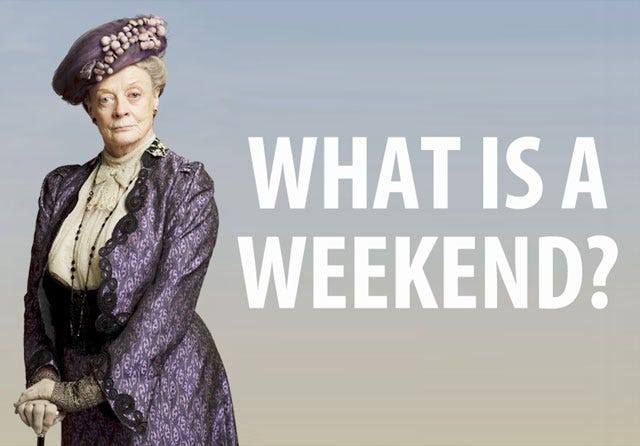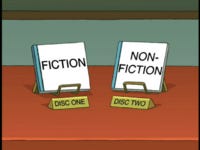So What, Who Cares (vol 2, issue 86) How reading every page of a book could make an author richer

Hello! Let's hear it for the weekend, unless Saturday and Sunday are part of your usual working week. In which case ... let's hear it for life's rich pageant! If your work week does include Saturday and/or Sunday, does it feel different than a Monday-to-Friday work week does? Do you have an actual two-days-away-from-the-office break or is it broken up over a few days? Do you like it like that? Or are you in a work situation where you basically work when you want, take breaks when you want? Dish with me via Twitter or email.
*
The phrase "the attention economy" is about to get a whole new meaning: Amazon will be paying some authors based not on the number of e-books downloaded, but on the number of pages read within the book. This is not something that's happening to, say, Stephen King's Under the Dome. Rather, the new compensation scheme is being applied to authors of books that are self-published and distributed through Amazon’s Kindle Unlimited and Kindle Owners’ Lending Library.

How will Amazon keep authors honest about how many "pages" someone's reading on their Kindle? By rolling out a standardized metric known as the Kindle Edition Normalized Page Count, which is pegged to the location where a reader starts reading. The only way to game the metric is to include a lot of illustrations and tables in your work.
So what? The publishing industry's revenue model is currently predicated on the notion that it doesn't matter if people read the book. It matters that people buy the book in the first place. (This is how books become best-sellers even if people give up on them halfway through, cough cough, Stephen Hawking's A Brief History of Time, cough cough.)

While Amazon's scheme doesn't currently affect books brokered through publishers, it will provide a massive data pool of reader data over time: What percentage of books are read completely, where readers are likely to bail, which genres command more sustained reader attention, what kinds of books get re-reads from readers. What do you think Amazon is going to do with this data?
Who cares? Publishers will. As I pointed out above, Amazon's going to amass all sorts of data about reader behavior and what's saleable. According to Nielsen research, Amazon currently controls more than 40% of the U.S. book sales market, and has a lock on over 65% of the electronic book market.

And Amazon has already signaled that it wants to revise financial terms with traditional publishers. Remember last year's fight with Hachette? If you don't, a refresher: Last year, Amazon wanted to change the terms of its sales with Hachette: It would cap all Hachette-published e-books at $9.99, then have a revenue model where it took 30% of every sale and Hachette would figure out how to split the remaining 70% between itself and the author. When Hachette didn't play ball and took the dispute public, Amazon responded by refusing to take pre-orders for Hachette books and delaying the shipping on Hachette books already in stock. The dispute kindled in May last year and took until November to resolve.

Although Amazon's nailed into deals with big-house publishers right now, what's going to happen when those deals are up for renewal and Amazon can come to the table with a raft of data saying, "Here's what books make money and why. Now defend your pricing structure as a value proposition for us -- and for the reader. Because we can go totally transparent on 'better value for your download' if we have to."
But there's another reason for publishers to care: What if they can buy the data Amazon's going to amass? One of the biggest expenses in publishing used to be returns, i.e. the books that didn't sell and had to be sent back to the publisher. If a small publishing company can get data about what's selling and why, it can tailor its print run to a more accurate audience projection.
Or publishers can run a few self-publishing experiments and use the compensation system as a way to collect data on their end. Either way, this is less about how authors get paid and more about how the data readers provide will end up shaping the future of what books are published at all.
*
Your pop-culture note of the day: I have alluded before (vol 1, issue 16) to how much I enjoy Josh Kilmer-Purcell's second memoir, The Bucolic Plague: How Two Manhattanites Became Unconventional Gentlemen Farmers, which details the nightmarish grind of rehabbing a historic farm while also juggling a high-powered career in Manhattan right as a recession hits. It's one of my favorite books in the "white-collar worker sows some seeds, reaps a crop of insight" genre, and I have followed the Beekman 1802 expansion with considerable interest because the business of marketing your farm as a brand is basically a spectator sport for this urbanite.
Anyway, we needed some tomato sauce the other week, and I grabbed a jar of Mortgage Lifter Vino Vino Pa

sta Sauce from the shelves at Target (where it's retailing for a dollar more than what the Beekman 1802 website is charging). And in a nice bit of serendipity, Fast Company just released a video about how Brent Kilmer-Purcell and Josh Ridge are using the sauce sales to extend their brand and fund a little bit of farm-aid as well. They do a little future-casting about what to expect on grocery-store shelves, which is a timely topic for devoted SW,WC readers (vol 2, issue 85; vol 2, issue 79).
But my recommendation to you all is actually Josh Kilmer-Purcell's first memoir, I Am Not Myself These Days, which chronicles his exhausting twenties (ad copywriter by day, drag queen by night) and doomed love affair with a crack-addled gigolo. It's a vivid snapshot of a moment in New York City's history that would be impossible to repeat today -- read the book with "Remembering Web 1.0's Click + Drag Subculture" open on your smartphone's browser. And then wonder why this hasn't been made into a small independent film yet.
*
Are there typos? I apologize in advance. The only editing class I did not get an A in was copyediting.
Did you miss an issue of So What, Who Cares? The archive is here. If you really like So What, Who Cares?, tell a friend to subscribe. And do not hesitate to hit me up via email or on Twitter. Thanks for reading!

